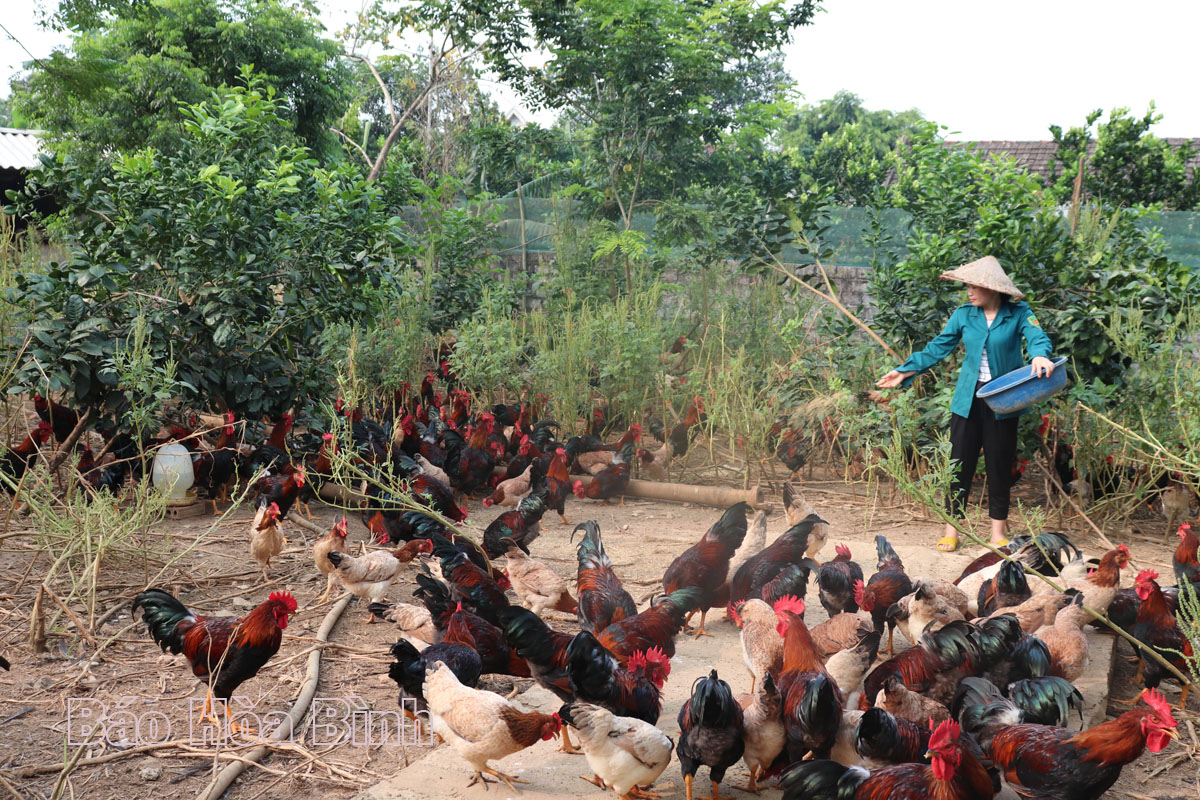
(HBO) - In 2021, authorities, sectors, businesses and people in Yen Thuy district of Hoa Binh province exerted efforts to surmount numerous hardships and enjoyed positive results in socio-economic development. The district fulfilled 15 out of the 17 targets, with some surpassing the initial plan, said Vice Chairman of the People’s Committee Bui Huyen.
Family of Bui Thi Hue
in Ho 1 hamlet, Ngoc Luong commune (Yen Thuy district), earns 270 million VND
per year by raising chickens.
Argo-forestry-fishery production value hit nearly 1.53 trillion VND (67 million
USD) in 2021, up 1.91 percent compared to the plan and 9.6 percent against the
previous year.
The district is home to six communes meeting criteria of the national target
programme on building new-style rural areas, equivalent to 60 percent. All the
communes fulfil at least 10 criteria.
Yen Thuy ranked second in administrative reform across Hoa Binh province last
year.
Despite various challenges it faced, the district rolled out concerted measures
to contribute to State budget. It collected 186 billion VND, higher than the
assigned target by the province by 41 percent.
About 627.7 billion VND was collected for the provincial budget, exceeding the
province’s target by 27.2 percent.
Seventeen new firms and five representative offices were set up in the district
in 2021, bringing the total to 153 and 110, respectively, with a combined
charter capital of about 2 trillion VND.
The Lac Thinh industrial park was expanded by about 560 ha and a resort owned
by FLC Group to 705 ha. New cooperatives were set up in line with the value
chain and applying VietGAP standards.
The district also kept a close eye on COVID-19 outbreaks and ensured sufficient
devices at concentrated quarantine facilities, as well as effectively carried
out the vaccination campaign.
This year, it will work to realise the dual targets of curbing the spread of
COVID-19 and bolstering socio-economic development in a flexible and efficient
manner. Production growth rate is expected to hit 13.5 percent and per capita
income 48 million VND.
The district aims to send 127.5 billion VND to the State budget and raise the
urbanisation rate to 20 percent. It strives to reduce the share of poor
households by at least 1 percent a year./.
The Standing Board of the Hoa Binh provincial Party Committee has agreed in principle on a proposal by the Standing Board of the Party Committee of Hoa Binh city to gather feedback on the city’s 1:2000 zoning plan, which forms part of its broader urban development strategy.
Hoa Binh province has made notable progress in public administration reform and digital government development, with the satisfaction index among citizens and businesses reaching over 84%, according to recent government evaluations.
Thanks to great efforts by local authorities in recent times, the governance and public administration performance of Mai Chau district has been significantly improved.
In the afternoon of June 6, the Party Committee, the People's Council, the People's Committee and the Fatherland Front of Lac Son district solemnly held a meeting to celebrate the 139th anniversary of the district's founding (1886–2025) and the 79th anniversary of the establishment of the district's Party Committee (1946–2025). There was the attendance of Mr. Bui Van Thang, the Vice Chairman of the Provincial People's Council; Mr. Quach Tat Liem, the Vice Chairman of the Provincial People's Committee; Ms. Dang Bich Ngoc, the Deputy Head of the National Assembly Delegation of the province; as well as the former leaders of the province and district through various periods, who are the natives of the district.
Implementing the Politburo’s Resolution No. 57-NQ/TW on breakthroughs in science – technology, innovation, and digital transformation is a golden opportunity for the northern mountainous province of Hoa Binh to renew growth model, improve competitive edge and shorten digital gap.
Resolution 57-NQ/TW, issued by the Politburo on December 22, 2024, identifies sci-tech, innovation, and digital transformation as strategic breakthroughs to build a developed and prosperous nation. In Hoa Binh province, this spirit is not just a slogan, it’s being put into action through concrete initiatives that form a "new development triangle”: digital citizenship, digital economy, and digital administration.



